- Home
- Jack London
The Faith of Men Page 7
The Faith of Men Read online
Page 7
“Ay tank we haf another drink,” hiccoughed Ans Handerson, craftily changing the subject against a more propitious time.
And thereafter, to bring about that propitious time, his own sack began to see-saw between his hip pocket and the scales. Bill and Kink were coy, but they finally yielded to his blandishments. Whereupon he grew shy and drew Bidwell to one side. He staggered exceedingly, and held on to Bidwell for support as he asked-
“They ban all right, them men, you tank so?”
“Sure,” Bidwell answered heartily. “Known ’em for years. Old sour doughs. When they sell a claim, they sell a claim. They ain’t no air-dealers.”
“Ay tank Ay buy,” Ans Handerson announced, tottering back to the two men.
But by now he was dreaming deeply, and he proclaimed he would have the whole claim or nothing. This was the cause of great pain to Hootchinoo Bill. He orated grandly against the “hawgishness” of chechaquos and Swedes, albeit he dozed between periods, his voice dying away to a gurgle, and his head sinking forward on his breast. But whenever roused by a nudge from Kink or Bidwell, he never failed to explode another volley of abuse and insult.
Ans Handerson was calm under it all. Each insult added to the value of the claim. Such unamiable reluctance to sell advertised but one thing to him, and he was aware of a great relief when Hootchinoo Bill sank snoring to the floor, and he was free to turn his attention to his less intractable partner.
Kink Mitchell was persuadable, though a poor mathematician. He wept dolefully, but was willing to sell a half-interest for two hundred and fifty dollars or the whole claim for seven hundred and fifty. Ans Handerson and Bidwell laboured to clear away his erroneous ideas concerning fractions, but their labour was vain. He spilled tears and regrets all over the bar and on their shoulders, which tears, however, did not wash away his opinion, that if one half was worth two hundred and fifty, two halves were worth three times as much.
In the end,-and even Bidwell retained no more than hazy recollections of how the night terminated,-a bill of sale was drawn up, wherein Bill Rader and Charles Mitchell yielded up all right and title to the claim known as 24 ELDORADO, the same being the name the creek had received from some optimistic chechaquo.
When Kink had signed, it took the united efforts of the three to arouse Bill. Pen in hand, he swayed long over the document; and, each time he rocked back and forth, in Ans Handerson’s eyes flashed and faded a wondrous golden vision. When the precious signature was at last appended and the dust paid over, he breathed a great sigh, and sank to sleep under a table, where he dreamed immortally until morning.
But the day was chill and grey. He felt bad. His first act, unconscious and automatic, was to feel for his sack. Its lightness startled him. Then, slowly, memories of the night thronged into his brain. Rough voices disturbed him. He opened his eyes and peered out from under the table. A couple of early risers, or, rather, men who had been out on trail all night, were vociferating their opinions concerning the utter and loathsome worthlessness of Eldorado Creek. He grew frightened, felt in his pocket, and found the deed to 24 ELDORADO.
Ten minutes later Hootchinoo Bill and Kink Mitchell were roused from their blankets by a wild-eyed Swede that strove to force upon them an ink-scrawled and very blotty piece of paper.
“Ay tank Ay take my money back,” he gibbered. “Ay tank Ay take my money back.”
Tears were in his eyes and throat. They ran down his cheeks as he knelt before them and pleaded and implored. But Bill and Kink did not laugh. They might have been harder hearted.
“First time I ever hear a man squeal over a minin’ deal,” Bill said. “An’ I make free to say ’tis too onusual for me to savvy.”
“Same here,” Kink Mitchell remarked. “Minin’ deals is like horse-tradin’.”
They were honest in their wonderment. They could not conceive of themselves raising a wail over a business transaction, so they could not understand it in another man.
“The poor, ornery chechaquo,” murmured Hootchinoo Bill, as they watched the sorrowing Swede disappear up the trail.
“But this ain’t Too Much Gold,” Kink Mitchell said cheerfully.
And ere the day was out they purchased flour and bacon at exorbitant prices with Ans Handerson’s dust and crossed over the divide in the direction of the creeks that lie between Klondike and Indian River.
Three months later they came back over the divide in the midst of a snow-storm and dropped down the trail to 24 ELDORADO. It merely chanced that the trail led them that way. They were not looking for the claim. Nor could they see much through the driving white till they set foot upon the claim itself. And then the air lightened, and they beheld a dump, capped by a windlass that a man was turning. They saw him draw a bucket of gravel from the hole and tilt it on the edge of the dump. Likewise they saw another, man, strangely familiar, filling a pan with the fresh gravel. His hands were large; his hair wets pale yellow. But before they reached him, he turned with the pan and fled toward a cabin. He wore no hat, and the snow falling down his neck accounted for his haste. Bill and Kink ran after him, and came upon him in the cabin, kneeling by the stove and washing the pan of gravel in a tub of water.
He was too deeply engaged to notice more than that somebody had entered the cabin. They stood at his shoulder and looked on. He imparted to the pan a deft circular motion, pausing once or twice to rake out the larger particles of gravel with his fingers. The water was muddy, and, with the pan buried in it, they could see nothing of its contents. Suddenly he lifted the pan clear and sent the water out of it with a flirt. A mass of yellow, like butter in a churn, showed across the bottom.
Hootchinoo Bill swallowed. Never in his life had he dreamed of so rich a test-pan.
“Kind of thick, my friend,” he said huskily. “How much might you reckon that-all to be?”
Ans Handerson did not look up as he replied, “Ay tank fafty ounces.”
“You must be scrumptious rich, then, eh?”
Still Ans Handerson kept his head down, absorbed in putting in the fine touches which wash out the last particles of dross, though he answered, “Ay tank Ay ban wort’ five hundred t’ousand dollar.”
“Gosh!” said Hootchinoo Bill, and he said it reverently.
“Yes, Bill, gosh!” said Kink Mitchell; and they went out softly and closed the door.
THE ONE THOUSAND DOZEN
David Rasmunsen was a hustler, and, like many a greater man, a man of the one idea. Wherefore, when the clarion call of the North rang on his ear, he conceived an adventure in eggs and bent all his energy to its achievement. He figured briefly and to the point, and the adventure became iridescent-hued, splendid. That eggs would sell at Dawson for five dollars a dozen was a safe working premise. Whence it was incontrovertible that one thousand dozen would bring, in the Golden Metropolis, five thousand dollars.
On the other hand, expense was to be considered, and he considered it well, for he was a careful man, keenly practical, with a hard head and a heart that imagination never warmed. At fifteen cents a dozen, the initial cost of his thousand dozen would be one hundred and fifty dollars, a mere bagatelle in face of the enormous profit. And suppose, just suppose, to be wildly extravagant for once, that transportation for himself and eggs should run up eight hundred and fifty more; he would still have four thousand clear cash and clean when the last egg was disposed of and the last dust had rippled into his sack.
“You see, Alma,”-he figured it over with his wife, the cosy dining-room submerged in a sea of maps, government surveys, guide-books, and Alaskan itineraries,-“you see, expenses don’t really begin till you make Dyea-fifty dollars’ll cover it with a first-class passage thrown in. Now from Dyea to Lake Linderman, Indian packers take your goods over for twelve cents a pound, twelve dollars a hundred, or one hundred and twenty dollars a thousand. Say I have fifteen hundred pounds, it’ll cost one hundred and eighty dollars-call it two hundred and be safe. I am creditably informed by a Klondiker just come out that I can buy a
boat for three hundred. But the same man says I’m sure to get a couple of passengers for one hundred and fifty each, which will give me the boat for nothing, and, further, they can help me manage it. And… that’s all; I put my eggs ashore from the boat at Dawson. Now let me see how much is that?”
“Fifty dollars from San Francisco to Dyea, two hundred from Dyea to Linderman, passengers pay for the boat-two hundred and fifty all told,” she summed up swiftly.
“And a hundred for my clothes and personal outfit,” he went on happily; “that leaves a margin of five hundred for emergencies. And what possible emergencies can arise?”
Alma shrugged her shoulders and elevated her brows. If that vast Northland was capable of swallowing up a man and a thousand dozen eggs, surely there was room and to spare for whatever else he might happen to possess. So she thought, but she said nothing. She knew David Rasmunsen too well to say anything.
“Doubling the time because of chance delays, I should make the trip in two months. Think of it, Alma! Four thousand in two months! Beats the paltry hundred a month I’m getting now. Why, we’ll build further out where we’ll have more space, gas in every room, and a view, and the rent of the cottage’ll pay taxes, insurance, and water, and leave something over. And then there’s always the chance of my striking it and coming out a millionaire. Now tell me, Alma, don’t you think I’m very moderate?”
And Alma could hardly think otherwise. Besides, had not her own cousin,-though a remote and distant one to be sure, the black sheep, the harum-scarum, the ne’er-do-well,-had not he come down out of that weird North country with a hundred thousand in yellow dust, to say nothing of a half-ownership in the hole from which it came?
David Rasmunsen’s grocer was surprised when he found him weighing eggs in the scales at the end of the counter, and Rasmunsen himself was more surprised when he found that a dozen eggs weighed a pound and a half-fifteen hundred pounds for his thousand dozen! There would be no weight left for his clothes, blankets, and cooking utensils, to say nothing of the grub he must necessarily consume by the way. His calculations were all thrown out, and he was just proceeding to recast them when he hit upon the idea of weighing small eggs. “For whether they be large or small, a dozen eggs is a dozen eggs,” he observed sagely to himself; and a dozen small ones he found to weigh but a pound and a quarter. Thereat the city of San Francisco was overrun by anxious-eyed emissaries, and commission houses and dairy associations were startled by a sudden demand for eggs running not more than twenty ounces to the dozen.
Rasmunsen mortgaged the little cottage for a thousand dollars, arranged for his wife to make a prolonged stay among her own people, threw up his job, and started North. To keep within his schedule he compromised on a second-class passage, which, because of the rush, was worse than steerage; and in the late summer, a pale and wabbly man, he disembarked with his eggs on the Dyea beach. But it did not take him long to recover his land legs and appetite. His first interview with the Chilkoot packers straightened him up and stiffened his backbone. Forty cents a pound they demanded for the twenty-eight-mile portage, and while he caught his breath and swallowed, the price went up to forty-three. Fifteen husky Indians put the straps on his packs at forty-five, but took them off at an offer of forty-seven from a Skaguay Croesus in dirty shirt and ragged overalls who had lost his horses on the White Pass trail and was now making a last desperate drive at the country by way of Chilkoot.
But Rasmunsen was clean grit, and at fifty cents found takers, who, two days later, set his eggs down intact at Linderman. But fifty cents a pound is a thousand dollars a ton, and his fifteen hundred pounds had exhausted his emergency fund and left him stranded at the Tantalus point where each day he saw the fresh-whipsawed boats departing for Dawson. Further, a great anxiety brooded over the camp where the boats were built. Men worked frantically, early and late, at the height of their endurance, caulking, nailing, and pitching in a frenzy of haste for which adequate explanation was not far to seek. Each day the snow-line crept farther down the bleak, rock-shouldered peaks, and gale followed gale, with sleet and slush and snow, and in the eddies and quiet places young ice formed and thickened through the fleeting hours. And each morn, toil-stiffened men turned wan faces across the lake to see if the freeze-up had come. For the freeze-up heralded the death of their hope-the hope that they would be floating down the swift river ere navigation closed on the chain of lakes.
To harrow Rasmunsen’s soul further, he discovered three competitors in the egg business. It was true that one, a little German, had gone broke and was himself forlornly back-tripping the last pack of the portage; but the other two had boats nearly completed, and were daily supplicating the god of merchants and traders to stay the iron hand of winter for just another day. But the iron hand closed down over the land. Men were being frozen in the blizzard which swept Chilkoot, and Rasmunsen frosted his toes ere he was aware. He found a chance to go passenger with his freight in a boat just shoving off through the rubble, but two hundred hard cash, was required, and he had no money.
“Ay tank you yust wait one leedle w’ile,” said the Swedish boat-builder, who had struck his Klondike right there and was wise enough to know it-“one leedle w’ile und I make you a tam fine skiff boat, sure Pete.”
With this unpledged word to go on, Rasmunsen hit the back trail to Crater Lake, where he fell in with two press correspondents whose tangled baggage was strewn from Stone House, over across the Pass, and as far as Happy Camp.
“Yes,” he said with consequence. “I’ve a thousand dozen eggs at Linderman, and my boat’s just about got the last seam caulked. Consider myself in luck to get it. Boats are at a premium, you know, and none to be had.”
Whereupon and almost with bodily violence the correspondents clamoured to go with him, fluttered greenbacks before his eyes, and spilled yellow twenties from hand to hand. He could not hear of it, but they over-persuaded him, and he reluctantly consented to take them at three hundred apiece. Also they pressed upon him the passage money in advance. And while they wrote to their respective journals concerning the Good Samaritan with the thousand dozen eggs, the Good Samaritan was hurrying back to the Swede at Linderman.
“Here, you! Gimme that boat!” was his salutation, his hand jingling the correspondents’ gold pieces and his eyes hungrily bent upon the finished craft.
The Swede regarded him stolidly and shook his head.
“How much is the other fellow paying? Three hundred? Well, here’s four. Take it.”
He tried to press it upon him, but the man backed away.
“Ay tank not. Ay say him get der skiff boat. You yust wait-”
“Here’s six hundred. Last call. Take it or leave it. Tell ’m it’s a mistake.”
The Swede wavered. “Ay tank yes,” he finally said, and the last Rasmunsen saw of him his vocabulary was going to wreck in a vain effort to explain the mistake to the other fellows.
The German slipped and broke his ankle on the steep hogback above Deep Lake, sold out his stock for a dollar a dozen, and with the proceeds hired Indian packers to carry him back to Dyea. But on the morning Rasmunsen shoved off with his correspondents, his two rivals followed suit.
“How many you got?” one of them, a lean little New Englander, called out.
“One thousand dozen,” Rasmunsen answered proudly.
“Huh! I’ll go you even stakes I beat you in with my eight hundred.”
The correspondents offered to lend him the money; but Rasmunsen declined, and the Yankee closed with the remaining rival, a brawny son of the sea and sailor of ships and things, who promised to show them all a wrinkle or two when it came to cracking on. And crack on he did, with a large tarpaulin square-sail which pressed the bow half under at every jump. He was the first to run out of Linderman, but, disdaining the portage, piled his loaded boat on the rocks in the boiling rapids. Rasmunsen and the Yankee, who likewise had two passengers, portaged across on their backs and then lined their empty boats down through the bad water to Bennett.<
br />
Bennett was a twenty-five-mile lake, narrow and deep, a funnel between the mountains through which storms ever romped. Rasmunsen camped on the sand-pit at its head, where were many men and boats bound north in the teeth of the Arctic winter. He awoke in the morning to find a piping gale from the south, which caught the chill from the whited peaks and glacial valleys and blew as cold as north wind ever blew. But it was fair, and he also found the Yankee staggering past the first bold headland with all sail set. Boat after boat was getting under way, and the correspondents fell to with enthusiasm.
“We’ll catch him before Cariboo Crossing,” they assured Rasmunsen, as they ran up the sail and the Alma took the first icy spray over her bow.
Now Rasmunsen all his life had been prone to cowardice on water, but he clung to the kicking steering-oar with set face and determined jaw. His thousand dozen were there in the boat before his eyes, safely secured beneath the correspondents’ baggage, and somehow, before his eyes were the little cottage and the mortgage for a thousand dollars.
It was bitter cold. Now and again he hauled in the steering-sweep and put out a fresh one while his passengers chopped the ice from the blade. Wherever the spray struck, it turned instantly to frost, and the dipping boom of the spritsail was quickly fringed with icicles. The Alma strained and hammered through the big seas till the seams and butts began to spread, but in lieu of bailing the correspondents chopped ice and flung it overboard. There was no let-up. The mad race with winter was on, and the boats tore along in a desperate string.
“W-w-we can’t stop to save our souls!” one of the correspondents chattered, from cold, not fright.
“That’s right! Keep her down the middle, old man!” the other encouraged.
Rasmunsen replied with an idiotic grin. The iron-bound shores were in a lather of foam, and even down the middle the only hope was to keep running away from the big seas. To lower sail was to be overtaken and swamped. Time and again they passed boats pounding among the rocks, and once they saw one on the edge of the breakers about to strike. A little craft behind them, with two men, jibed over and turned bottom up.

 The Son of the Wolf
The Son of the Wolf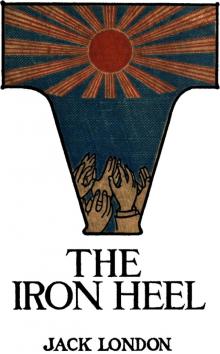 The Iron Heel
The Iron Heel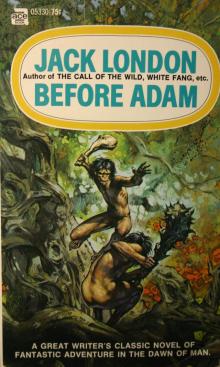 Before Adam
Before Adam Smoke Bellew
Smoke Bellew The Call of the Wild
The Call of the Wild The Valley of the Moon Jack London
The Valley of the Moon Jack London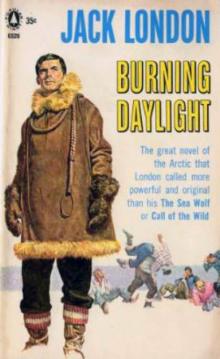 Burning Daylight
Burning Daylight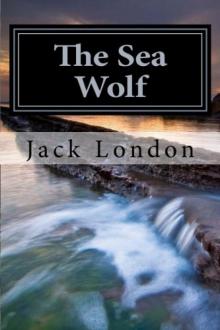 The Sea Wolf
The Sea Wolf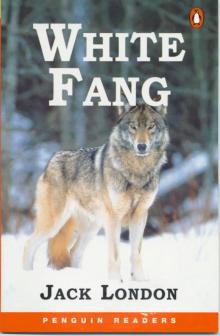 White Fang
White Fang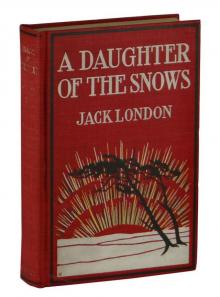 A Daughter of the Snows
A Daughter of the Snows The Night-Born
The Night-Born A Son Of The Sun
A Son Of The Sun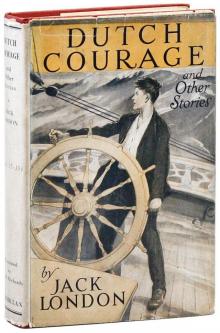 Dutch Courage and Other Stories
Dutch Courage and Other Stories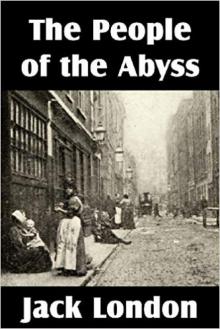 The People of the Abyss
The People of the Abyss Michael, Brother of Jerry
Michael, Brother of Jerry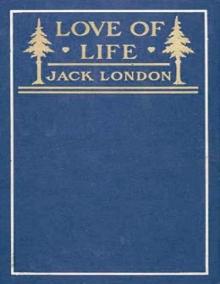 Love of Life, and Other Stories
Love of Life, and Other Stories Lost Face
Lost Face The Road
The Road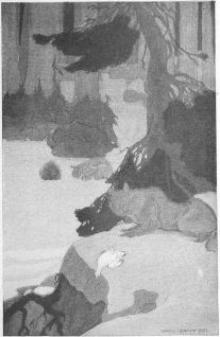 Love of Life
Love of Life The Turtles of Tasman
The Turtles of Tasman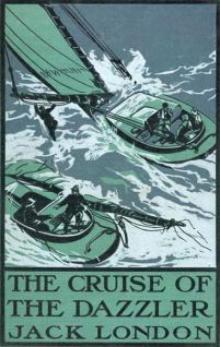 The Cruise of The Dazzler
The Cruise of The Dazzler The Heathen
The Heathen The Scab
The Scab The Faith of Men
The Faith of Men Adventure
Adventure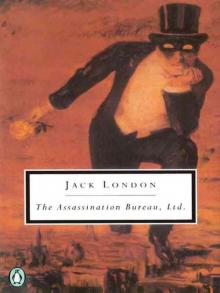 The Assassination Bureau, Ltd.
The Assassination Bureau, Ltd. The Call of the Wild, White Fang, and Other Stories
The Call of the Wild, White Fang, and Other Stories The Call of the Wild and Selected Stories
The Call of the Wild and Selected Stories Jerry of the Islands
Jerry of the Islands Hearts of Three
Hearts of Three The House of Pride
The House of Pride Moon-Face and Other Stories
Moon-Face and Other Stories Children of the Frost
Children of the Frost South Sea Tales
South Sea Tales The Strength of the Strong
The Strength of the Strong The Jacket (The Star-Rover)
The Jacket (The Star-Rover) The Little Lady of the Big House
The Little Lady of the Big House John Barleycorn
John Barleycorn ADaugter of Snows
ADaugter of Snows The Mutiny of the Elsinore
The Mutiny of the Elsinore Northland Stories
Northland Stories Tales of the Fish Patrol
Tales of the Fish Patrol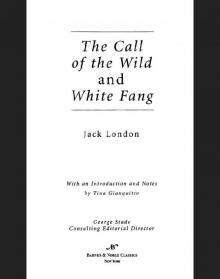 Call of the Wild and White Fang (Barnes & Noble Classics Series)
Call of the Wild and White Fang (Barnes & Noble Classics Series) The Valley of the Moon
The Valley of the Moon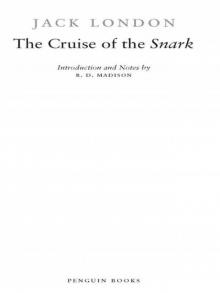 The Cruise of the Snark
The Cruise of the Snark The Game
The Game An Autobiography of Jack London
An Autobiography of Jack London